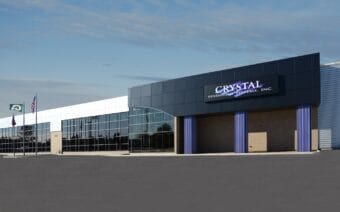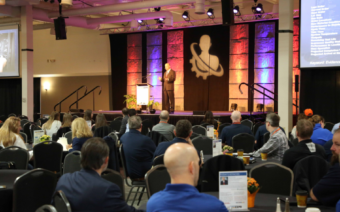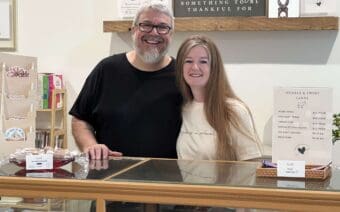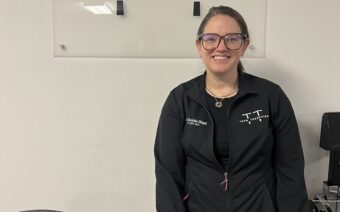
July 8, 2024
WAUSAU – For brothers Herb and Ervin Kolbe, what began in their family’s washhouse in 1946 would lead to their brand – Kolbe Windows & Doors – being produced, sold and installed nationwide today.
For Jeff DeLonay, what began as a post-college summer job, he said, has led to a 40-year career with Kolbe, having now served as its president for the last decade.
DeLonay said the window and door industry is an environment of constant change – one he finds endlessly rewarding and instructive.
“Daily, you learn something different in this business,” he said. “Sometimes it’s millwork related or customer relations related. Sometimes it’s relevant to the sales process or the products you have. Every day, you’re building something new for someone.”
DeLonay said at Kolbe, careful customization – such as incorporating the right blend of profiles and shadow lines in the millwork – is part of providing the high-end, rarified design solutions sought by homebuilders.
“Sometimes the smallest of details makes the home,” he said. “Some of those things you do for that client – as a custom situation – win you the job.”
With Kolbe’s business model of creating a base model of customizable products, DeLonay said the company continues to honor the Kolbe brothers’ legacy of high standards.
More recently, though, DeLonay said Kolbe’s partnerships have allowed it to offer products its founders couldn’t have fathomed – namely, smart glass.
“You can have smart glass that acts like people’s glasses – when they go inside and outside of a home,” he said. “(The windows) can tint because of the amount of sunlight passing through the glass. Then you can have these pieces of glass that will electronically tint.”
With the latter, DeLonay said a mere flick of a switch can turn what appears to be a normal windowpane into privacy glass – which he said is typically what people refer to when using the term smart glass.
Kolbe customers have the option of integrating this innovation into a number of the company’s windows – both stationary and venting – as well as its swinging doors.

DeLonay said he relishes the opportunity to combine emerging technology with Kolbe’s own creative advancements.
“We make new things, but the industry helps elevate itself by bringing all these other options to market,” he said. “It’s exciting. A lot of things are going to happen in the window and door industry.”
Windows of opportunity
Herb and Ervin Kolbe began Kolbe & Kolbe Millwork Co. after Ervin returned from World War II, DeLonay said, creating their careers from scratch, and in the process, all but commandeering the outbuilding where their mother did the family’s laundry.
As their workload increased, DeLonay said the sibling duo hired their other two brothers – Walter as a salesperson and Arnold as a machinist.
The addition of staff meant an increase in workspace was needed – plus, their mother was beyond ready to reclaim her washhouse.
Nearly 40 years later, DeLonay said he started working at the company from the suggestion of his brother, Robin, who was working for Kolbe – where he is likewise still employed.
As the company approaches its 80th anniversary, DeLonay said he describes Kolbe as “a family organization functioning inside of a national sales situation – a family company in a corporate world.”
DeLonay said because he “grew up inside the organization,” he’s able to uphold the familial nature and principles of the business – thanks in part to the time he spent with Herb before his passing in 2001.
“Every day we had lunch together, and it was a blessing from the standpoint of capturing what that founder believed the culture of the organization to be,” he said. “(Herb) was a person who considered the team members as his biggest assets. He would constantly be on the (production) floor – and if he wasn’t on the floor, he was visiting customers.”
At the end of every customer visit, DeLonay said Herb would ask the same question – “what can we do to help you?”
“A lot of times different geographic areas require nuances in a product, and the customers would bring up either those nuances or propose ideas of different types of products they thought we should make,” he said. “Herb would bring those back to the research and development (R&D) area as a general idea. Sometimes he would sketch it out on a notepad as he flew back – and he would say, ‘take a look at this idea – this is what the customer is looking for.’ And R&D would work on that and bring it to market if possible.”
One example of the Kolbe team’s ability to modernize its traditional products, DeLonay said, was when the company began covering jamb liners in double-hung windows “with wood veneer facings – so you don’t have to see the vinyl anymore.”

DeLonay said Herb constantly sought opportunities for providing customers with new solutions and conceptual improvements, leading to a new department – separate from R&D – entirely devoted to innovation.
“We can’t sit here in Wausau, Wisconsin, with rose-colored glasses and think we know what’s going on in the market,” he said. “When you design something, you make sure you take a prototype and go ask people – ‘do you think this will work for you?’”
Doors of perception
DeLonay said the Kolbe team continually communicates with nationwide distributors, architects and builders for feedback and also attends trade shows – even for seemingly unrelated industries, such as automotive or electronics – for inspiration.
“If you keep your eyes open, you can find the trends – even though they aren’t so apparent,” he said.
What’s perceived to be popular or opportune is curated at Kolbe Windows & Doors’ primary production facility in Wausau – “not more than 10 or 15 miles from the Kolbe farm,” DeLonay said, “and about three or four blocks from where (Robin and I) grew up.”
“We’re lucky enough in the Wausau area to have both aluminum extruders and paint finishers,” he said. “We’re trying to work with as many local organizations as we can to support the local communities.”
He said Kolbe has an additional facility in Manawa devoted to fiberglass products and another in Phoenix, Arizona, focusing on aluminum products.
DeLonay said these facilities have helped supply Kolbe’s “mid-high- to high-end” products for new construction and renovation projects from coast to coast, as well as in Canada, Hawaii, Bermuda and Europe.
Through it all, DeLonay said the Kolbe team has stayed true to Herb’s model of innovation inspired by customers’ needs – whether by:
- Improving production materials to reduce product maintenance
- Reinforcing to provide better protection against salt damage in coastal environments
- Creating custom doors of different materials, finishes, colors and styles to aesthetically stand out
- Crafting uniquely shaped windows with various opening mechanisms, hardware and pane sizes and divisions
“The variation is quite expansive,” he said. “I’ve seen things in the (production) plant I’d never thought we’d build.”
Getting smart
Smart glass, DeLonay said, presents another innovative way to achieve the construction and designs of customers’ dreams.
He said while smart glass is relatively new in residential applications, the technology has already been useful in commercial settings like conference rooms.
In hospitals, DeLonay said the privacy glass has helped improve sanitation by supplanting cloth curtains in favor of compact windows to be wiped clean.

In home settings, he said smart glass is used in front doors, bathrooms and other rooms with large windows, such as fitness rooms.
“It(’s use) can be isolated, or it can be whole rooms if you want,” he said.
DeLonay said the privacy setting of smart glass is impenetrable to human vision, turning it “an opaque color – almost like a white” that still allows light through.
“When you turn the electricity on, the particles inside (the glass) align – they straighten out so you can see through,” he said. “When you turn the power off, (the particles) scatter and becomes a privacy glass.”
Though smart glass costs more than traditional glass, he said, it absolves homeowners from investing in window treatments such as curtains, shades, drapes, rods, brackets and motorized tracks – while also saving space.
“Clients are looking for less clutter inside the home,” he said. “(With smart glass), I can flick the switch and I don’t have to get up and draw blinds. I don’t have that extra product being attached – it’s contained in the window product.”
DeLonay said even though new advances in window and door technology have continued to emerge after the passing of his mentor, Herb, he will always honor Herb’s practice of listening to, rather than talking at the customer.
“What you’re here to do is satisfy their dream,” he said. “If you close your mouth and open your ears, you will hear their dream come through – and then you focus on the products that will make that happen.”
Between Kolbe’s well-established customization capabilities, culture and service, and the ever-evolving technology the company can implement, DeLonay said the possibilities are wide open for the window and door industry.
“It’s rather exciting,” he said. “Companies are working on these kinds of things, whether it be VIG (vacuum-insulated glass) or glass that creates energy. The glass world is not done yet – creating things window and door manufacturers can put into our products.”
Visit kolbewindows.com for more information.
 A shining ‘Star’ of restoration and community philanthropy
A shining ‘Star’ of restoration and community philanthropy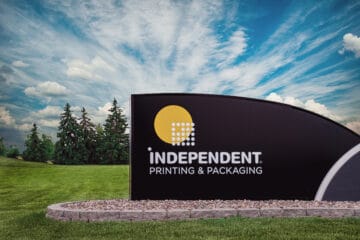 Hayes expands parent facility operations to better serve customers
Hayes expands parent facility operations to better serve customers


